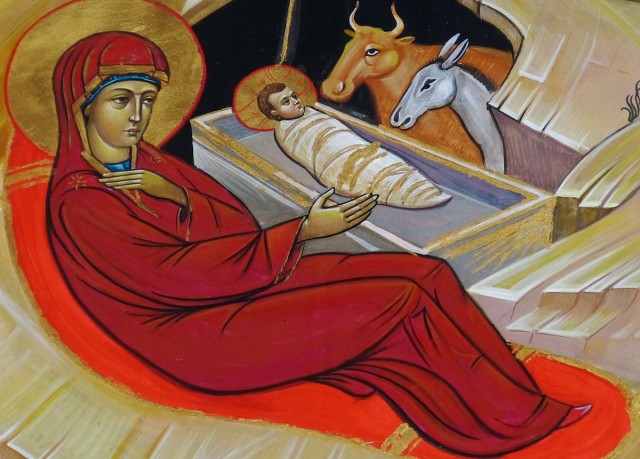
First we gave you a taste of Pushkin’s more romantic side, and then we showed you Pushkin being playful. Today, in the third installment of our mini-series on naughty Pushkin poetry, we turn to our old friend Jack Murnighan for inspiration, and his erstwhile Nerve.com column Jack’s Naughty Bits. There’s a real dearth of Pushkin translations online, and we never could have found this week’s poem without him. As Jack wrote in his original introduction to this excerpt:
The Gavriliada [is] a raucous rewriting of the Immaculate Conception. In Pushkin’s version, God chooses Mary because she’s smoking hot and under-serviced by her husband. Claiming an “Armenian” source, Pushkin gives the Virgin Mother more action in an afternoon than most saints get their whole lives. Ah, finally a religion I can believe in! Blasphemy never had it so good.
Don’t you wish Jack was your friend, too? Without further ado, here’s more Pushkin that’s both festive and very, very naughty…
From the Gavriliada by Alexander Pushkin
Translated by Max Eastman (modified slightly by Jack Murnighan)
In stilly fields, far from Jerusalem,
Far from those sports and young philanderers,
Bred up by Satan but to ruin us,
A gentle beauty, seen as yet none,
And not capricious, lived her tranquil life.
Her husband was a man respectable
And old. A carpenter and joiner he,
The real workman in the town,
And day and night having so much to do,
Now with his level, now with faithful saw,
He little tasted of these charms he owned.
The hidden flower, as though by ancient fate
To some high other honor designate,
Upon its little stem did not unfold.
The languid man with his old sprinkling pot
Gazed on the flower at times, but sprinkled not.
He lived, a father, with his tender bride;
He fed her well — and nothing else beside.
But from just heaven in those days of old,
The All-highest God inclined a gracious eye
Upon the comely shape of his hand-maiden,
The bosom sweetly pure — and feeling heat,
In the depth of his all-wisdom he ordained
To bless the blameless garden thus forgotten,
And make it fertile with mysterious fruit.
Then summoning his favorite, Gabriel,
He told him in straight prose about his love.
The church somewhat suppressed their conversation,
The evangelist perhaps was negligent,
But following an Armenian tradition
Gabriel received the praise of God,
Was noted tactful and intelligent,
And down to Mary in the twilight sent.
He would have liked, I judge, a different honor.
He had as an ambassador been true,
Delivered documents, brought back the news —
All well enough, but still he had pride!
He veiled his inward thought: professed that God
No safer herald-angel had, nor surer —
To put it in our earthly tongue — procurer.
But now the old fiend, Satan, slumbered not.
He heard while sauntering among the stars,
That God had this young Jewess in his eye,
A sweetheart who should save our tottering race
From everlasting torment in his hell.
The fiend was irritated — and was active.
The All-Highest meanwhile, sitting in the sky
In sweet despondency, forgot the world,
Which tripped without him on its own sweet way.
But Mary, look! A most exquisite snake!
With lovely luring scales and shiny colors!
There in the branches right above your head!
And listen too! “Beloved of heaven,” he says,
“Fly not — I am your most obedient slave!”
Can it be possible? A miracle!
Who speaks these words of accent soft and level?
Whose is that oily voice? Of course! The Devil.
The wily beast unwound his rattling tail;
He arched his neck up slowly like a yoke,
And slid right down in front of gentle Mary.
Breathing hot wishes in her breast, he said:
“Young Eve like you
Was modest in her garden, clever, kind,
But without love she bloomed in melancholy.
Alone, and eye to eye, the man, the maid,
Along the shore of Eden’s shining waters,
Dragged out in quietness a resting life.
A bore to them the day’s monotony:
The shady grove, their youth, their idleness —
Nothing, awakened in their bodies love.
With hand in hand they walked, existed, ate.
They yawned by daytime, and by night they held
No festivals of passion, knew no joys . . .
What say you? Is not that old Hebrew God
A tyrant, glum, unjust and stubborn, who
Loved Adam’s girl and kept her for himself?
And where’s the honor there? Where is the fun?
I just resolved, in spite of the Creator,
To break this dreadful sleep of man and maid.
No doubt you’ve often heard how it all happened:
Two apples, hanging in the wondrous bough,
A happy sign, a symbol of love’s summons,
Made clear to her vague imaginings,
Awakened in her breast a vague desire.
She knew her beauty, knew the bliss of it,
The trembling heart, the lover’s nakedness.
I saw them — O, I saw the exquisite
Beginnings of my science, love! Away
Into the little thicket wood they walked.
Their glances quickly wandered, and their hands.
Between the darling legs of his young love,
Embarrassed, mute and awkward, Adam sought
The lovely drunken ravishment of bliss:
He put his question to the source of joy,
And seething to the deeps, he lost himself.
And Eve, unfearful of the wrath of God,
All flame, with hair thrown wide, and lips that barely,
Barely moved to answer Adam’s lips,
And tears of love, and love’s unconsciousness,
Lay in the palm-tree’s shadow — and young earth
Strewed with her brightest blossoms their young love.”
And suddenly the serpent disappeared.
A beauteous youth was sitting at her feet,
And light that streamed upon her from his eyes
In silence asked most eloquently something.
With one hand he presents to her a flower,
The other crumples back her simple linen,
Steals up hastily beneath her gown,
And the light finger touches playfully
The tender mysteries. It all seemed new
And wonderful to Mary, and ingenious.
And blushes that were not the blush of shame
Played forth upon her beauty virginal,
And languid heat and an impatient sighing
Lifted the young lovely breast of Mary.
She did not speak: she suddenly lost strength,
And closed her glistening eyes — a simple lass!
Inclining toward her Fiend her gentle head,
She cried but “Ah!” and fell back on the grass.
And suddenly above the wearied maid,
Cavorting on a sporting wing, appears
Young Gabriel, love’s envoy, son of Heaven!
At sight of him our beauty hid her eyes.
The Accursed spoke, and frowning, hot with hate,
Biting his lip and sideways glowering,
He struck the Archangel Gabriel in the teeth.
The Angel yelled; he tottered; his left knee
Went down to earth; but suddenly he rose
And, filled with unexpected heat, he swung
And sent the Fiend a right hook to the jaw.
The Devil groaned; he paled; they leaped and clinched,
And knit together, rolled across the meadow.
When just by luck the squirming Gabriel grinned
And set his teeth into that fatal spot
(Superfluous in most all kinds of battle)
The haughty limb wherewith the Devil sinned.
Yelling for mercy, the Accursed fell,
And staggered dimly down the road to hell.
Breathless upon this battle Mary stared;
And the victor turned to her with grace.
He knelt before her, gently pressed
Her hand; she dropped her eyes and Gabriel kissed her.
She blushed confusedly, but stayed quite still;
And Gabriel made bold to touch her breast.
“Leave me alone!” she whispered. And with this
The last faint groan of innocence
Was stifled in a mighty angel’s kiss.
Already Gabriel with tidings fair
Flies home to heaven: God is waiting there.
“Well, what’s the news?” he says.
Says Gabriel:
“I did all that I could — I sounded her.”
“And she?”
“She’s willing.”
In her small corner, drunk with memory,
Our Mary rests upon a rumpled sheet.
Her body burns with bliss and with desire.
New heat already in her youthful breast,
She whispers in the darkness, “Gabriel!”
Another gift is waiting for his love.
She moves away the covers with her foot,
And downward gives a little happy smile.
She is complacent in her nakedness,
With her own grace and loveliness surprised.
And in a tender-thoughtful midnight spell
She sins a little, charming-languidly.
She drinks the cup of tranquil consolation.
I hear you laugh, O crafty Fiend in hell!
But look! Darts in the window from above
On snow-white wings a little fluffy dove!
He circles, tries a happy tune — and flap! —
He lights right in the languid maiden’s lap!
Under the little linen gown he hustles,
He pecks her rose, and squirms about, and rustles,
With little claw and little beak he bustles.
‘Tis He — precisely He! — and Mary guessed
That someone else was in the birdie’s breast.
Squeezing her knees together tight, she screamed,
She sighed, prayed, trembled, wept, but seemed
Unable to forestall the little dove.
He cooed and quivered in the heat of love,
Then fell in rapture, lightly slumbering,
Love’s blossom shielded by his downy wing.
At last the little pigeon flew away.
And weary Mary thought: What can I say!
One, two and three— that’s quite the revel,
To have all on a single summer day
The Deity, an Angel, and the Devil!
















